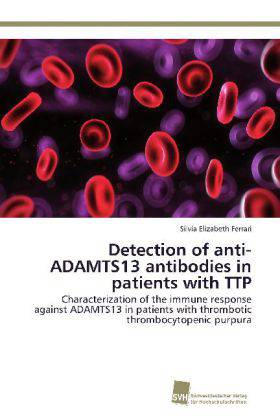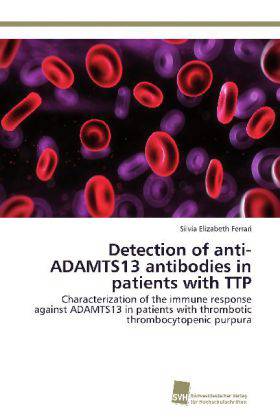
- Afhalen na 1 uur in een winkel met voorraad
- Gratis thuislevering in België vanaf € 30
- Ruim aanbod met 7 miljoen producten
- Afhalen na 1 uur in een winkel met voorraad
- Gratis thuislevering in België vanaf € 30
- Ruim aanbod met 7 miljoen producten
Zoeken
Detection of anti-ADAMTS13 antibodies in patients with TTP
Characterization of the immune response against ADAMTS13 in patients with thrombotic thrombocytopenic purpura
Silvia Elizabeth Ferrari
Paperback | Engels
€ 59,45
+ 118 punten
Omschrijving
Thrombotic thrombocytopenic purpura (TTP) is a life-threatening disease caused by a deficiency in ADAMTS13 which in the acquired form is provoked by autoantibodies against this protease. The main objective of this work was to study the pathophysiologic and prognostic value of anti-ADAMTS13 antibodies in patients with acquired TTP. The surveyed antibody profile revealed the presence of mainly IgG followed by IgA and IgM antibodies. IgG1-4 and IgA ADAMTS13-specific immune complex (ICs) were detected. IgG4 was the most prevalent IgG subclass, present either as free antibody or as ICs. IgG antibodies in combination with high inhibitor titers at disease presentation were associated with persistence of undetectable ADAMTS13 activity in clinical remission. TTP patients with high IgG4 and undetectable IgG1 levels were more prone to relapse than patients with low IgG4 and detectable IgG1 levels suggesting that IgG4 could be a useful biomarker for identification of patients at risk of disease recurrence. The comprehensive characterization of anti-ADAMTS13 antibodies as well as circulating ADAMTS13-specific ICs may contribute to a better understanding of the mechanisms leading to acquired TTP
Specificaties
Betrokkenen
- Auteur(s):
- Uitgeverij:
Inhoud
- Aantal bladzijden:
- 104
- Taal:
- Engels
Eigenschappen
- Productcode (EAN):
- 9783838138626
- Verschijningsdatum:
- 27/05/2014
- Uitvoering:
- Paperback
- Afmetingen:
- 150 mm x 220 mm
- Gewicht:
- 163 g

Alleen bij Standaard Boekhandel
+ 118 punten op je klantenkaart van Standaard Boekhandel
Beoordelingen
We publiceren alleen reviews die voldoen aan de voorwaarden voor reviews. Bekijk onze voorwaarden voor reviews.











